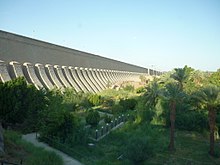Old Aswan Dam
| Aswan Low Dam | |
|---|---|

Aswan Low Dam
|
|
| Official name | Aswan Low Dam |
| Location | Egypt |
| Coordinates | 24°02′02″N 32°51′57″E / 24.03389°N 32.86583°ECoordinates: 24°02′02″N 32°51′57″E / 24.03389°N 32.86583°E |
| Construction began | 1899 |
| Opening date | 1902 |
| Owner(s) | Egypt |
| Operator(s) | Egypt |
| Dam and spillways | |
| Type of dam | Gravity, masonry buttress |
| Impounds | River Nile |
| Height | 36 m (118 ft) |
| Length | 1,950 m (6,400 ft) |
| Spillway type | Floodgates |
| Reservoir | |
| Creates | tailwater of Lake Nasser |
| Total capacity | 5,300×106 m3 (4,300,000 acre·ft) |
| Power station | |
| Commission date | Aswan I:1960 Aswan II:1980-85 |
| Turbines | Aswan I: 7 x 40 MW (54,000 hp) Kaplan-type Aswan II: 4 x 67.5 MW (90,500 hp) Kaplan-type |
| Installed capacity | 592 MW (794,000 hp) (Aswan I,II) |
The Aswan Low Dam or Old Aswan Dam is a gravity masonry buttress dam on the Nile River in Aswan, Egypt. The dam was built at the former first cataract of the Nile, and is located about 1000 km up-river and 690 km (direct distance) south-southeast of Cairo. When initially constructed between 1899 and 1902, nothing of its scale had ever been attempted; on completion, it was the largest masonry dam in the world. The dam was designed to provide storage of annual floodwater and augment dry season flows to support greater irrigation development and population growth in the lower Nile. The dam, originally limited in height by conservation concerns, worked as designed, but provided inadequate storage capacity for planned development and was raised twice, between 1907–1912 and again 1929–1933. These heightenings still did not meet irrigation demands and in 1946 it was nearly over-topped in an effort to maximize pool elevation. This led to the investigation and construction of the Aswan High Dam 6 kilometres (3.7 mi) upstream.
The earliest recorded attempt to build a dam near Aswan was in the 11th century, when the Arab polymath and engineer Ibn al-Haytham (known as Alhazen in the West) was summoned to Egypt by the Fatimid Caliph, Al-Hakim bi-Amr Allah, to regulate the flooding of the Nile, a task requiring an early attempt at an Aswan Dam. After his field work convinced him of the impracticality of this scheme, and fearing the Caliph's anger, he feigned madness. He was kept under house arrest from 1011 until al-Hakim's death in 1021, during which time he wrote his influential Book of Optics.
Following their 1882 invasion and occupation of Egypt, the British began construction of the first dam across the Nile in 1898. Construction lasted until 1902, and it was opened on 10 December 1902, by HRH the Duke of Connaught and Strathearn. The project was designed by Sir William Willcocks and involved several eminent engineers of the time, including Sir Benjamin Baker and Sir John Aird, whose firm, John Aird & Co., was the main contractor. Capital and financing were furnished by Ernest Cassel.
...
Wikipedia
